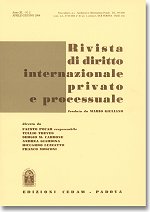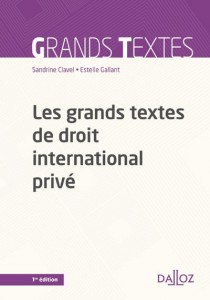On 25 February 2014, the European Court of Human Rights ruled in the case of Avotinš v. Latvia (application no. 17502/07) that the Brussels I Regulation imposes on Member States a duty to enforce judgments in civil and commercial matters, which triggers the Bosphorus presomption of compatibility of the actions of the enforcing state with the European Convention.
The judgment, which is only available in French, reveals a lack of knowledge of European private intenational law instruments by the members of the court.
The Court rules that the foundation of the Brussels I Regulation is mutual trust. That’s of course correct. It then insists that under the Brussels I Regime, declarations of enforceability are granted almost automatically, after mere formal verification of documents. It thus concludes that under the Regulation, Member States are obliged to enforce foreign judgments, and should thus benefit as requested states from the Bosphorus presumption.
49. La Cour relève que, selon le préambule du Règlement de Bruxelles I, ce texte se fonde sur le principe de « confiance réciproque dans la justice » au sein de l’Union, ce qui implique que « la déclaration relative à la force exécutoire d’une décision devrait être délivrée de manière quasi automatique, après un simple contrôle formel des documents fournis, sans qu’il soit possible pour la juridiction de soulever d’office un des motifs de non-exécution prévus par le présent règlement » (paragraphe 24 ci-dessus). À cet égard, la Cour rappelle que l’exécution par l’État de ses obligations juridiques découlant de son adhésion à l’Union européenne relève de l’intérêt général (Bosphorus Hava Yollar Turizm ve Ticaret Anonim irketi précité, §§ 150-151, et Michaud c. France, no 12323/11, § 100, CEDH 2012) ; le sénat de la Cour suprême lettonne se devait donc d’assurer la reconnaissance et l’exécution rapide et effective du jugement chypriote en Lettonie.
50. Devant les juridictions lettonnes, le requérant soutenait que la citation de comparaître devant le tribunal de district de Limassol et la demande de la société F.H.Ltd. ne lui avaient pas été correctement communiquées en temps utile, de sorte qu’il n’avait pas pu se défendre ; par conséquent, selon lui, la reconnaissance de ce jugement devait être refusée sur la base de l’article 34, point 2, du Règlement. Dans son arrêt du 31 janvier 2007, le sénat de la Cour suprême a écarté tous ses moyens – et, donc, l’application de l’article 34, point 2, du Règlement – en déclarant que, le requérant « n’ayant pas fait appel du jugement, les arguments de son avocat selon lesquels [il] ne se serait pas vu dûment notifier l’examen de l’affaire par un tribunal étranger, n’ont aucune importance ». Cela correspond en substance à l’interprétation donnée à la disposition susmentionnée par la Cour de justice des Communautés européennes dans l’arrêt Apostolides c. Orams, aux termes duquel « la reconnaissance ou l’exécution d’une décision prononcée par défaut ne peuvent pas être refusées au titre de l’article 34, point 2, du règlement no 44/2001 lorsque le défendeur a pu exercer un recours contre la décision rendue par défaut et que ce recours lui a permis de faire valoir que l’acte introductif d’instance ou l’acte équivalent ne lui avait pas été signifié ou notifié en temps utile et de telle manière qu’il puisse se défendre » (paragraphe 28 ci-dessus).
This is the part of the reasoning of the court which is plainly wrong. It fails to discuss the relevance of the public policy exception and the margin of appreciation that it offers to requested states to verify whether the state of origin respected fundamental rights.
PRESS RELEASE
The case concerned the enforcement in Latvia of a judgment delivered in Cyprus concerning the repayment of a debt. The applicant, an investment consultant who had borrowed money from a Cypriot company, complained that the Cypriot court had ordered him to repay his debt under a contract without summoning him properly and without guaranteeing his defence rights.
Like the Senate of the Latvian Supreme Court, the Court noted that the applicant should have appealed against the Cypriot court’s judgment. It took the view that the Latvian authorities, which had correctly fulfilled the legal obligations arising from Latvia’s status as a member State of the European Union, had sufficiently taken account of Mr Avotinš’
PRINCIPAL FACTS
The applicant, Peteris Avotinš, is a Latvian national who was born in 1954 and lives in the district of Riga (Latvia).
On 4 May 1999 Mr Avotinš and F.H.Ltd., a commercial company registered in Cyprus, signed before a notary a formal acknowledgement of his obligation to repay a debt. Mr Avotinš declared that he had borrowed 100,000 United States dollars from F.H.Ltd. and undertook to repay that amount with interest before 30 June 1999. The document stated that it would be governed “in all respects” by the laws of Cyprus and that Cypriot courts would have jurisdiction to hear all disputes arising from it.
Read more




